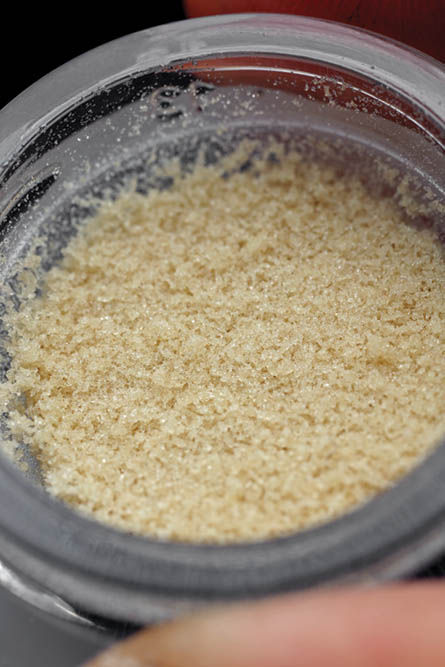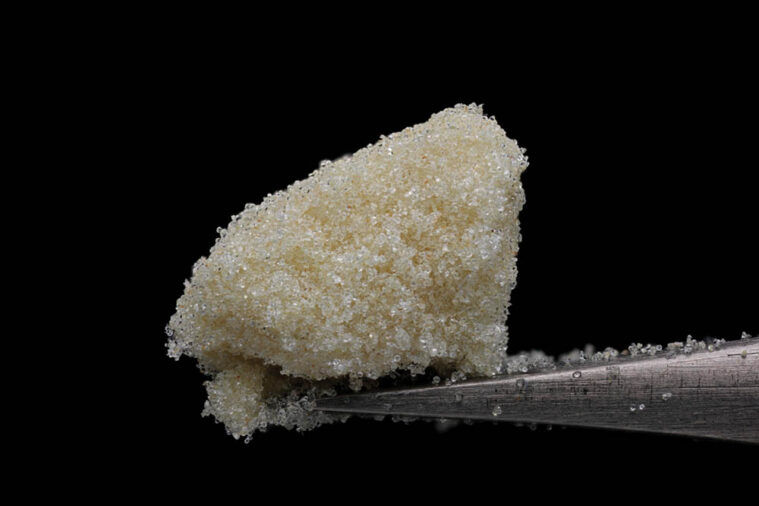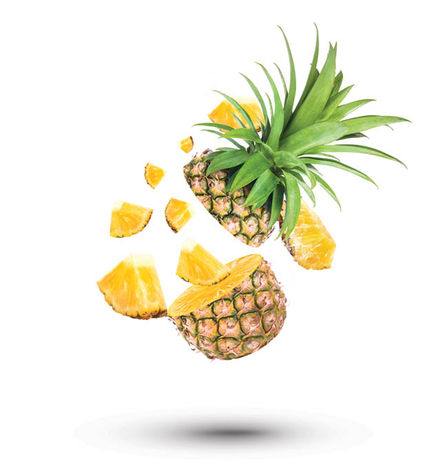Cultivators are typically going for buds with the best bag appeal. It’s all about growing out the fluffiest and fattest nugs that will sit looking pretty in their flower packaging. On the other hand, solventless extractors making hash and rosin are in pursuit of one very important (but often more inconspicuous) thing: resin.
In fact, growing specifically for solventless production has been dubbed “resin farming” and inspired an entire industry of breeding for “hash plants.” But if we’re going to get into resin farming and hash plants, we’ve got to talk trichomes first – the small, wispy structures on the surface of the Cannabis plant that look like little hairs.
The trichome head sits on top of the stalk and contains the highest concentrations of cannabinoids, terpenes, flavonoids and more. It’s basically where all the good stuff that determines the taste, aroma and medicinal effects of that particular plant is stored. Here the glands produce a sticky substance called resin to hold all those valuable compounds together and keep them safe from threats like pests and UV radiation. When a plant produces lots of trichome heads, its flowers will be visibly glistening with a thick, solid layer of sparkling resin – almost like they’re wearing a frosty fur coat!

Resin farmers are essentially growing to maximize the amount of these trichome heads (and therefore resin) on their plants, which are then extracted from the rest of the plant material to create solventless products. They for sure want to see that frosty fur coat.
Factors like the density, structure and consistency of trichome heads can all contribute to whether or not a strain is a “dumper” – meaning it dumps these large amounts of resin. While the way a plant is grown (e.g. the lights and nutrients used) can have a slight impact here, most of these trichome traits are controlled by the genetic makeup of the plant. Hence the need to create new Cannabis genetics tailored to trichome quality and resin production. Simply by nature, some strains tend to yield better or create higher quality solventless extracts than others. It’s why GMO and Papaya are known to be dumpers while old-school Kush and OG varietals rarely extract well.
So, breeding new strains for solventless production becomes like a puzzle. These breeders are identifying existing genetics with traits ideal for extraction, then putting them together to create something new that is (hopefully) even better than its individual components. For example, taking a GMO plant that absolutely dumps resin and crossing it with an OG strain that doesn’t yield high enough for commercial solventless production, but has an incredibly sought-after terpene profile. The goal here would be to breed these strains together and find a phenotype that yields well enough (thanks to the GMO parent) without losing that unique flavor from the OG parent.

Owner and Operator of legacy brand Pacific Northwest Roots, Ras Kaya Paul is one of the OGs when it comes to putting together these puzzles. He started working with the plant in the mid-’90s and grew his passion and knowledge into a successful growing and breeding enterprise, developing hash genetics now known across the country such as Kaya’s Koffee and The Freeze.
Ras Kaya explains, “When breeding for ‘hash plants’ there are many things to consider. Chief among these are exceptional terpenes, trichome type and proper yields. Many seed makers are recombining known hash plants and having success creating poly-hybrids for the masses – and that’s good for the people.”
“It’s also important to make a distinction and recognize the folks like Archive, 3rd Gen, and others like myself that have been at the craft for decades,” he continues, “developing those cornerstone genetics and hash-making techniques for others to build on. As with breeding for flowers, this kind of innovation for our industry requires testing and processing the genetics, then making thoughtful selections based on those results.”
With that, the pursuit of resin continues…
Household Names in Breeding for Resin
Bloom Seed Co.
Exotic Genetix
Oni Seed Co.
Little Lake Valley Seed Co.
Ras Kaya Paul of Pacific Northwest Roots
Masonic Seed Company
Top Dawg Seeds
DNA Genetics
Archive Seed Bank
Garden of Grease Seeds
3rd Gen Family Farm










